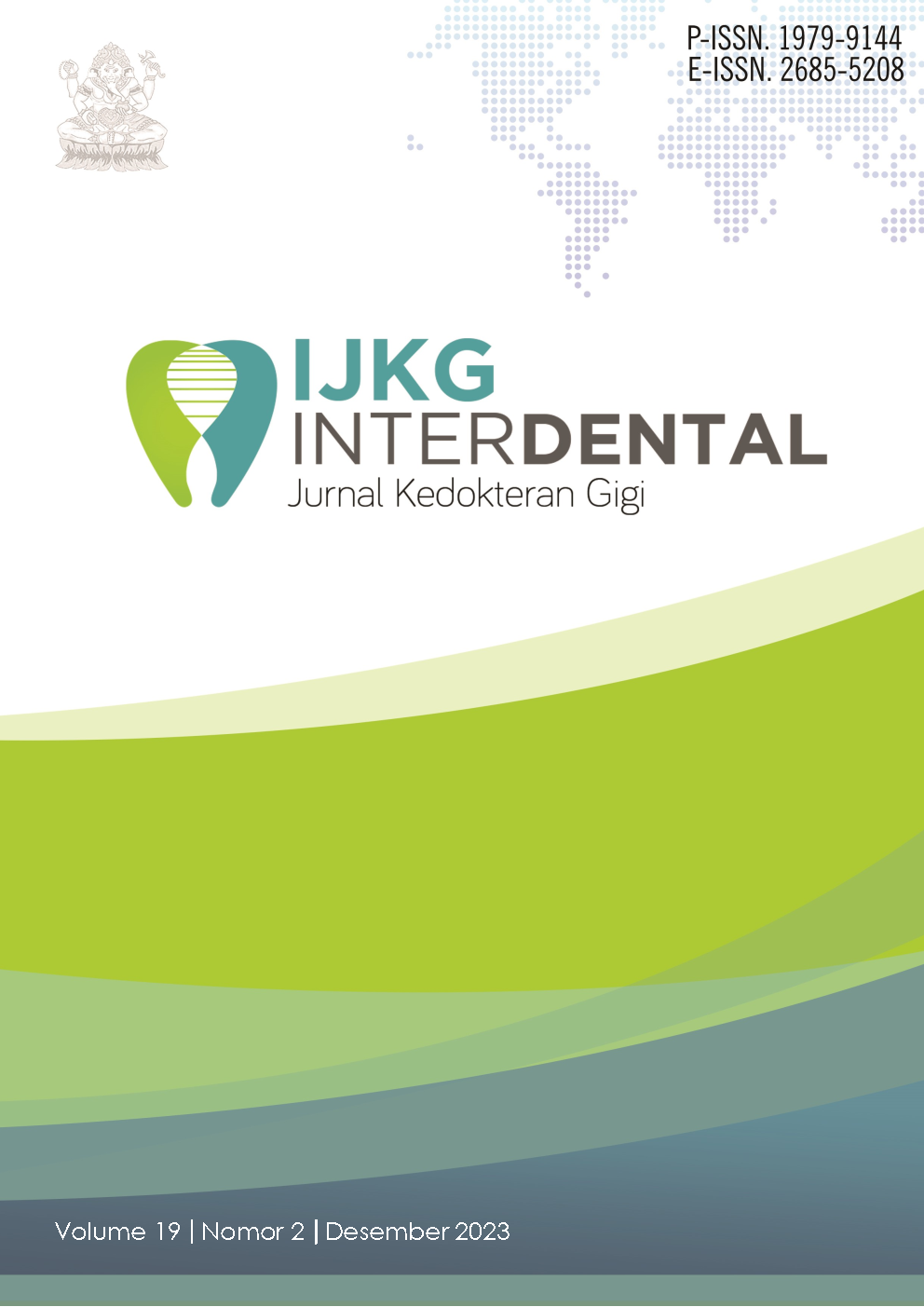THE RELATIONSHIP BETWEEN STRESS DURING THE COVID-19 PANDEMIC AND THE INCIDENCE OF RECURRENT APHTHOUS STOMATITIS
DOI:
https://doi.org/10.46862/interdental.v19i2.6672Keywords:
Pandemi COVID-19, Recurrent Aphthous Stomatitis, stresAbstract
Introduction: Recurrent Aphthous Stomatitis (SAR) is a common condition characterized by recurrent small, round, or ovoid multiple ulcers with clear boundaries and forming circles. The etiology of SAR is not yet clear, but some literature says SAR can be caused by psychological stress. Environmental changes and re-adaptation during the COVID-19 pandemic can affect stress levels.
Materials and Methods: The type of research conducted is analytical observational studies with a cross-sectional design. The research sample was 226 respondents of the undergraduate dental program at the University of Muhammadiyah Yogyakarta (UMY) class of 2019, 2020, 2021. Each respondent filled out the RASDX questionnaire to find out the existence of SAR and the PSS-10-C questionnaire to assess stress levels in the form of a google form. Then, the data was analyzed using SPSS version 20 with a contingency coefficient test to see the relationship between stress during the COVID-19 pandemic and the incidence of SAR.
Results and Discussion: The results showed that the majority of respondents were positive for SAR (20.3%). A total of 12 male respondents were positive for SAR (5.4%) and 34 female respondents were positive for SAR (15%). Measurements of stress levels attributed by the COVID-19 pandemic showed the majority of respondents experienced moderate stress (63.7%). A total of 12 respondents with mild stress, 33 respondents with moderate stress, and 1 respondent with severe stress were positive SAR. The results of the contingency coefficient test showed a value of p = 0.334.
Conclusion: There is no relationship between stress during the COVID-19 pandemic and the incidence of SAR. This is thought to be because the causative factors of SAR are multifactorial.
Downloads
References
Worldometer. COVID-19 Coronavirus Pandemic, 2022. https://www.worldometers.info/coronavirus/ Accessed Agustus 2022.
Cooke, J. E., Eirich, R., Racine, N., & Madigan, S. Prevalence of posttraumatic and general psychological stress during COVID-19: A rapid review and meta-analysis. Psychiatry Research; 2020. 292. https://doi.org/10.1016/J.PSYCHR ES.2020.11334
Dhopte, A., Naidu, G., Singh- Makkad, R., Nagi, R., Bagde, H., & Jain, S. (Psychometric analysis of stress, anxiety and depression in patients with recurrent aphthous Stomatitis-A cross-sectional survey based study. Journal of Clinical and Experimental Dentistry; 2018. 10(11), e1109. https://doi.org/10.4317/JCED.55012
Agus, S., Indah, W., & Felisha, B. Relationship among perceived stress, oral health status, stomatitis, and xerostomia in the community during the COVID-19 pandemic: A cross-sectional survey. Journal of International Oral Health; 2020 12(8).
Chavan, M., Jain, H., Diwan, N., Khedkar, S., Shete, A., & Durkar, S. Recurrent aphthous stomatitis: a review. Journal of Oral Pathology & Medicine : Official Publication of the International Association of Oral Pathologists and the American Academy of Oral Pathology; 2012, 41(8), 577–583. https://doi.org/10.1111/J.1600- 0714.2012.01134.X.
Suresh, K. V., Shenai, P., Chatra, L., Ronad, Y. A. A., Bilahari, N., Pramod, R. C., & Kumar, S. P. Oral mucosal diseases in anxiety and depression patients: Hospital based observational study from south India. Journal of Clinical and Experimental Dentistry; 2015. 7(1), e95–e99. https://doi.org/10.4317/jced.51764.
Shigemura, J., Ursano, R. J., Morganstein, J. C., Kurosawa, M., & Benedek, D. M. Public responses to the novel 2019 coronavirus (2019-nCoV) in Japan: Mental health consequences and target populations. Psychiatry and Clinical Neurosciences; 2020. 74(4), 281–282. https://doi.org/10.1111/pcn.12988.
Hernawati, S. Mekanisme selular dan molecular stress terhadap terjadinya rekuren aftosa stomatitis. Jurnal PDGI: 2013. 62 (1), 36-40
Cui, R. Z., Bruce, A. J., & Rogers, R. S. Recurrent aphthous stomatitis. Clinics in Dermatology; 2020. 34(4), 475–481. https://doi.org/10.1016/j.clindermat ol.2016.02.020.
Wowor, Y. P., Munayang, H., & Supit, A. Hubungan Stres dengan Stomatitis Aftosa Rekuren pada Mahasiswa Program Studi Pendidikan Dokter Gigi Universitas Sam Ratulangi. E- GIGI; 2019. 7(2), 71–75. https://doi.org/10.35790/eg.7.2.2019.23930.
Sulistiani, A., Hernawati, S., & P, A. M. Prevalensi dan Distribusi Penderita Stomatitis Aftosa Rekuren (SAR) di Klinik Penyakit Mulut RSGM FKG Universitas Jember pada Tahun 2014 (Prevalence and Distribution of Patients Recurrent Aphthous Stomatitis ( RAS ) in Oral Medicine Departement of Dental. Pustaka Kesehatan; 2017. 5(1), 169–176. https://jurnal.unej.ac.id/index.php/JPK/article/view/5749.
Sumintarti, & Marlina, E. Hubungan antara level estradiol dan progesterone dengan stomatitis aftosa rekuren. Dentofasial; 2012. 11(3), 137–141.
Masriadi. Epidemiology of recurrent aphthous stomatitis on the students of University of East Indonesia Makassar Epidemiologi stomatitis aftosa rekuren pada mahasiswa Universitas Indonesia Timur Makassar. Makassar Dental Journal; 2019. 8(3), 154–159. http://jurnal.pdgimakassar.org/inde x.php/MDJ/article/view/291
Odell, E. Cawson’s Essentials of Oral Pathology and Oral Medicine (9th ed.); 2017 elsevier.
Sari, R. K., Ernawati, D. S., & Soebadi, B. Recurrent Aphthous Stomatitis Related To Psychological Stress, Food Allergy and Gerd. ODONTO : Dental Journal; 2019. 6, 45. https://doi.org/10.30659/odj.6.0.45- 51.
Ślebioda, Z., Szponar, E., & Kowalska, A. Etiopathogenesis of recurrent aphthous stomatitis and the role of immunologic aspects: Literature review. Archivum Immunologiae et Therapiae Experimentalis; 2014. 62(3), 205–215. https://doi.org/10.1007/s00005- 013-0261-y
Downloads
Published
How to Cite
Issue
Section
License
Copyright (c) 2023 Afryla Femilian, Khulia Furaida, Afina Hasnasari Heningtyas

This work is licensed under a Creative Commons Attribution-ShareAlike 4.0 International License.
- Every manuscript submitted to must observe the policy and terms set by the Interdental Jurnal Kedokteran Gigi (IJKG)
- Publication rights to manuscript content published by the Interdental Jurnal Kedokteran Gigi (IJKG) is owned by the journal with the consent and approval of the author(s) concerned.
- Full texts of electronically published manuscripts can be accessed free of charge and used according to the license shown below.













